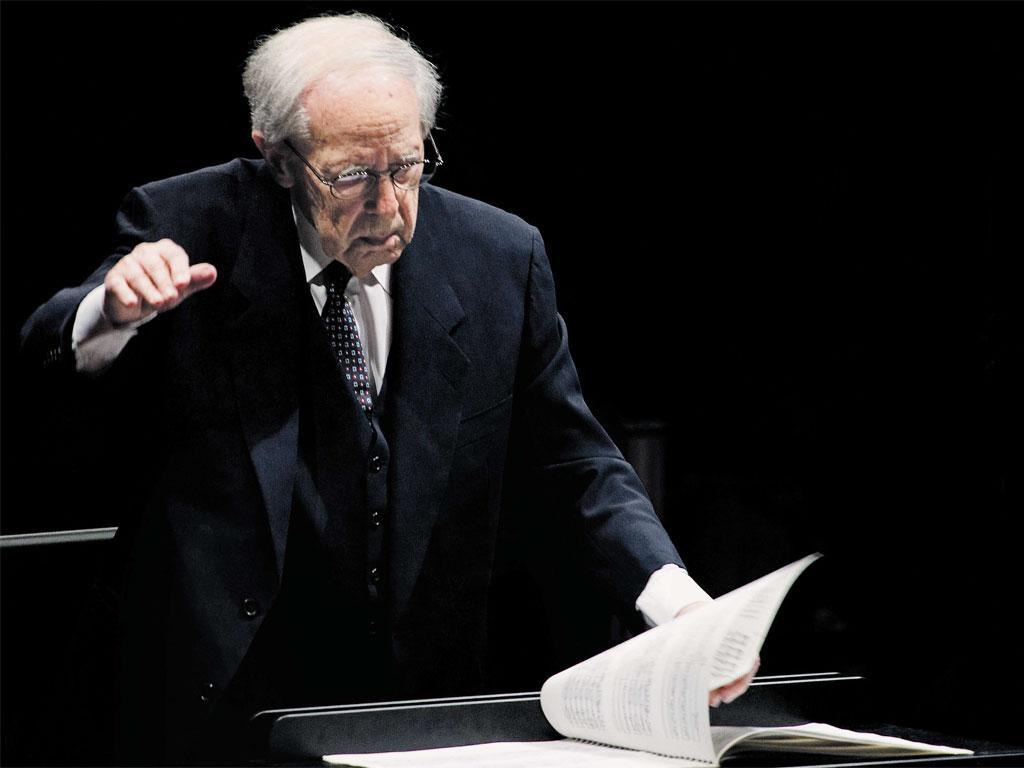Pierre Boulez: A very modern maestro
In his youth the composer called for the burning down of opera houses. Now aged 87, he is no less fiery

If Pierre Boulez is this energetic aged 87, imagine him at 30. Arriving at the Lucerne Festival, the composer, maestro and man of musical action is recovering from an eye operation; it obliged him to cancel his visit to the Proms, where the conductor, Daniel Barenboim, juxtaposed his works with the complete Beethoven symphonies. But he will not be kept back. "It forces me to stay quiet for an hour to let the eye rest," he remarks. "But it is very difficult to stay quiet."
Boulez remains the heart, spine and soul of musical modernism. Many consider him today's greatest living composer. His music makes for demanding listening, but once you open your ears to it, it can reveal entire vistas of sonic imagination and spectral beauty. And he affirms that he would like listeners to find it beautiful. "Sometimes it's difficult to go to this kind of beauty, which is different from other beauties," he says, "but I want the music to bring you into a sphere where you don't go generally."
He is a figure wreathed in myth. Some suggest he is a "musical Stalinist" (a term used by the composer Pierre Schaeffer); others, notably his performers, praise him as the nicest person they know. What's certain is that he challenges everything, in music and in life, analysing issues with visionary exactitude. Besides, he is not a talker, but a doer. "We don't come to the world just to look at it and accept it," he declares. In the 1950s he became notorious for the ferocity with which he called for the past to be swept away, seeking a blank slate for musical language to break with the preceding disasters of history.
"The 'tabula rasa' was something of my generation," Boulez says. "Works like Stockhausen's could not exist in the years 1933-45: this part of musical life was banned in Germany. It was the same in the USSR under Stalin. Therefore I could not adopt the Communist point of view, because we have seen that already and we know what it produces.
"It was not tabula rasa for pleasure. It was necessity, because this generation had, for us, failed to find something important. We did not want to prolong this kind of failure. We were radical in the sense that we tried to establish a new way of thinking. We did not succeed all the time – but it was important for us to begin from scratch."
He was, moreover, a very angry young man, kicking against the ultra-conservative musical establishment in his native France, where the music that galvanised him – Berg, Schoenberg, Bartók – remained unknown. Proving the point, it was down to Boulez to conduct the French stage premiere of Berg's operatic masterpiece, Wozzeck, as late as 1963. He rejected France until the then prime minister, Georges Pompidou, used the promise of state funding for a new research institute for electronic music, IRCAM, to tempt him back from Germany, where a new internationalism in music was flourishing at Darmstadt.
Boulez's early pronouncements – burn down opera houses, kill the Mona Lisa and so on – have clung to his image, perhaps excessively. Not that he has truly mellowed. "I was not more radical than I am now," he says, "but now I see that sometimes you have to be less direct – and more effective."
Among Boulez's more prophetic demands was an upheaval in traditional concert environments and formats. Five decades ago, the world was not ready to listen. Today, though, the increasing popularity of 'classical club nights' in London, New York, and at the Lucerne Festival – echoes Boulez's call for informal atmospheres between audience and performers.
"Recently the New York Philharmonic has done with concerts in the Armory what I tried to do as its music director in the 1970s. I was not successful because the time wasn't right."
In June the orchestra gave a performance in this unconventional venue on Park Avenue, featuring music by Boulez himself. It sold out and is streamed on the Internet until 2 October. He keeps dreaming: "Today people like to change the relationship between the sound and themselves. You could bring in improvised elements involving people's reactions to the sound, like a fountain of music: sometimes good, sometimes not, but always with the freedom of creating."
He is still composing, too. Currently he is trying to finish Notations – 12 pieces for piano, some dating back to 1945, which he has been reworking for orchestra. He would also love to adapt Beckett's Waiting for Godot – but will he really tackle it? "If you can give me an elixir of long life," Boulez twinkles.
Pierre Boulez gives a week of masterclasses at the Lucerne Festival from 1 September and conducts the Academy Orchestra on 7 September (lucernefestival.ch)
Join our commenting forum
Join thought-provoking conversations, follow other Independent readers and see their replies
Comments
Bookmark popover
Removed from bookmarks